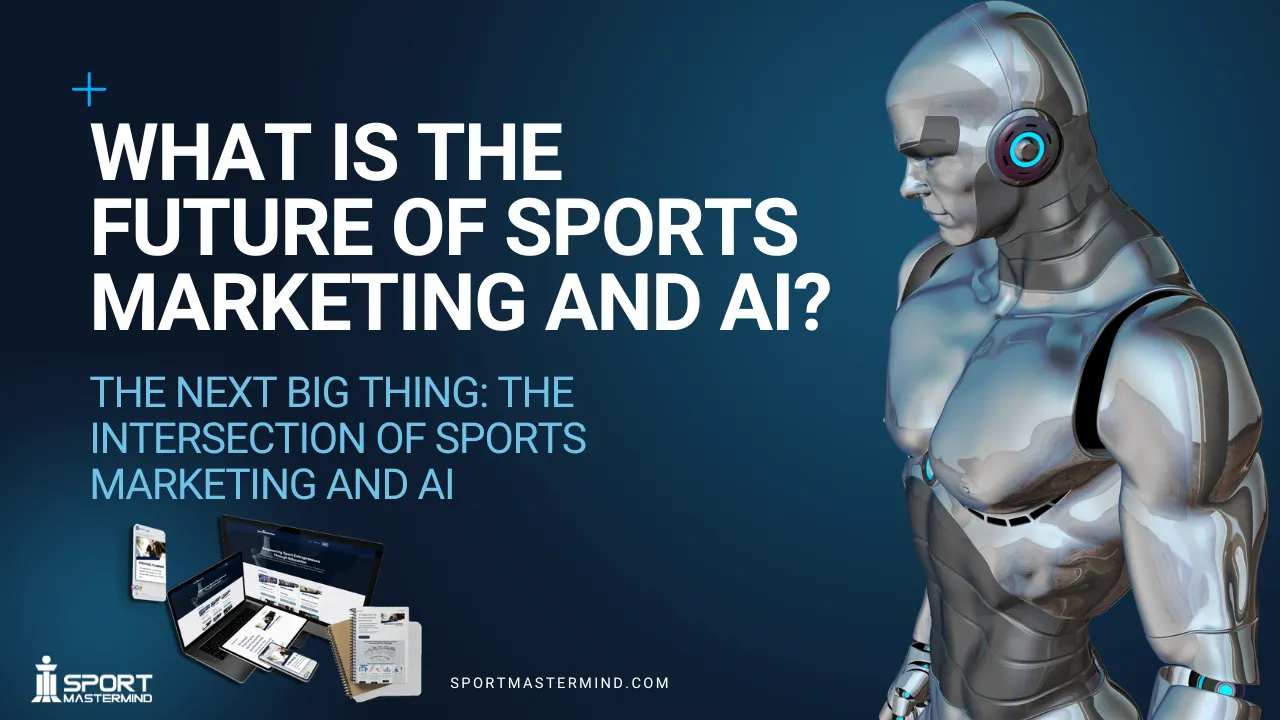The Messi Effect: How AI is Revolutionising Sport Marketing
Sport marketing has evolved over the years to become an essential aspect of the sports industry. It involves promoting sports teams, events, and products to fans, sponsors, and other stakeholders.
Artificial intelligence (AI) has also become increasingly popular in recent years, transforming the way businesses operate, including sport marketing. In this essay, we will discuss the role, benefits, and challenges of AI in sport marketing in the AI age.
The Role of AI in Sport Marketing
AI has revolutionised sport marketing by providing organisations with valuable insights that can help them make data-driven decisions.
AI algorithms can analyse large volumes of data, identify patterns, and provide recommendations that can help sports organisations improve their marketing strategies. Below are some of the keyways in which AI is changing sport marketing:
Data Analysis and Insights
AI algorithms can analyse data from various sources such as social media, websites, and customer feedback, providing organisations with valuable insights.
These insights can help sports organisations better understand their fans' behaviour, preferences, and needs, enabling them to create targeted marketing campaigns.
Personalisation and Targeting
AI-powered tools can create personalised marketing messages that are tailored to individual fans' preferences and interests. This can help sports organisations improve their engagement with fans, leading to increased loyalty and revenue.
Automation and Efficiency
AI-powered tools can automate many aspects of sport marketing, such as social media posting, email marketing, and customer service. This can help sports organisations save time and resources while improving the quality and consistency of their marketing efforts.
The Benefits of AI in Sport Marketing
The use of AI in sport marketing has several benefits for sports organisations. These benefits include:
Improved Fan Engagement
AI-powered tools can help sports organisations better understand their fans' behaviour and preferences, enabling them to create personalised marketing campaigns. This can lead to increased engagement and loyalty among fans.
Increased Revenue Streams
AI-powered tools can help sports organisations identify new revenue streams and optimise their existing ones. For example, AI algorithms can analyse ticket sales data and identify opportunities for upselling or cross-selling to fans.
Better Decision-Making
AI-powered tools can provide sports organisations with valuable insights that can help them make data-driven decisions. This can lead to more effective marketing strategies, improved fan engagement, and increased revenue.
The Challenges of AI in Sport Marketing
While AI has several benefits, it also presents some challenges for sports organisations. These challenges include:
Ethical Concerns
The use of AI in sport marketing raises ethical concerns, such as the potential for biased decision-making and the need to protect fan privacy. Sports organisations must ensure that they use AI ethically and transparently to avoid damaging their brand reputation.
Privacy Issues
AI algorithms rely on data to provide valuable insights. However, the collection and use of fan data raise privacy concerns. Sports organisations must ensure that they collect and use fan data in compliance with relevant privacy laws and regulations.
Dependence on Technology
The use of AI in sport marketing requires significant investments in technology and expertise. Sports organisations must ensure that they have the necessary resources to support the implementation and maintenance of AI-powered tools.
The Italy and ChatGTP will be a bid test-case, so the world's eyes are in Idaly and Europe!
Real word examples of AI in Sport Marketing:
Here are some examples of AI in sport marketing:
- The Messi/Pepsi personalised video campaign: In this campaign, Pepsi used Synthesia, an AI-powered video generation platform, to create personalised videos featuring soccer star Lionel Messi for fans. The campaign enabled fans to send personalised videos with Messi addressing their friends by name and speaking in their native language.
- The NBA's use of AI for social media marketing: The NBA has used AI to analyse social media data and identify trends and topics that resonate with fans. This has helped the NBA create more engaging social media content and improve fan engagement.
- Adidas' AI-powered personalised shopping experience: Adidas uses AI to analyse data on customers' preferences and purchase history to create personalised shopping experiences for customers. The AI-powered shopping experience recommends products based on customers' interests and preferences, improving customer engagement and sales.
- The NFL's use of AI for game predictions: The NFL has used AI algorithms to predict game outcomes and improve its betting and fantasy football offerings. The AI-powered predictions use data on team performance, player stats, and other factors to provide accurate predictions for fans.
- AI-powered chatbots for customer service: Many sports organisations are using AI-powered chatbots to improve their customer service offerings. The chatbots use natural language processing and machine learning to understand customers' queries and provide relevant information and assistance, improving the customer experience.
Messi/Pepsi AI Marketing Case Study
These are just a few examples of how AI is being used in sport marketing. As AI continues to evolve, we can expect to see even more innovative and effective use cases in the future. But let’s dive in further on the Messi/Pepsi AI marketing campaign.
These are just a few examples of how AI is being used in sport marketing. As AI continues to evolve, we can expect to see even more innovative and effective use cases in the future. But let’s dive in further on the Messi/Pepsi AI marketing campaign.
In recent years, artificial intelligence (AI) has become increasingly prevalent in the marketing industry. The Messi Messages campaign, created by PepsiCo brand Lay's and 180Amsterdam in collaboration with UNIT9, is a prime example of how AI technology can be used to create personalised video experiences that engage consumers on a deeper level.
The campaign, which featured football superstar Lionel Messi, enabled fans to send personalised videos with Messi addressing their friends by name and speaking in their native language. What made this possible was Synthesia's cutting-edge AI technology, which was used to generate a synthetic version of Messi.
All that was needed was for Messi to be recorded for five minutes in a green screen studio, speaking in his native Spanish. This footage was then used to train Synthesia's deep learning algorithms, resulting in a Synthetic Messi that could speak in eight different languages.
Using the Synthesia API, the campaign was able to personalise the messages with over 650 million video variations available in eight languages. The result was a highly personalised experience, with Messi speaking directly to fans in their own language and addressing them by name.
One of the key takeaways from the Messi Messages campaign is the power of personalisation in marketing. By leveraging AI technology, marketers can create highly customised experiences that resonate with consumers and drive engagement. The Messi Messages campaign was a huge success, receiving a Cannes Lion award in 2021, and reaching many more fans in their native tongue than ever before.
Businesses looking to create similar personalised video experiences can use Synthesia's Personalisation API, which allows for easy customisation and personalisation of video content without any coding knowledge required. The Messi/Pepsi campaign demonstrates the potential for AI-driven marketing and the impact that personalised video experiences can have on driving brand awareness and engagement.
Another interesting aspect of the Messi Messages campaign is the use of synthetic avatars. Synthetic avatars are digital representations of real people that can be used to create customised video content. In the case of the Messi Messages campaign, Synthesia's deep learning algorithms were used to create a Synthetic Messi based on just five minutes of recorded footage.
This technology has a wide range of applications in the marketing industry, from creating customised ads to virtual product demonstrations. The use of synthetic avatars also has the potential to reduce costs associated with hiring actors or celebrities for marketing campaigns, while still achieving a high level of personalisation.
All things considered, the Messi Messages campaign is a great example of how AI technology can be used to create unique and personalised experiences that engage consumers in a meaningful way.
By leveraging the power of deep learning algorithms and synthetic avatars, marketers can create campaigns that are more engaging, memorable, and effective in reaching their target audiences.
The success of the Messi Messages campaign highlights the importance of personalisation in marketing, and the potential for AI-driven marketing to revolutionise the sport industry.
Conclusion of the impact of AI in Sport Marketing
In conclusion, the use of AI in sport marketing is transforming the way sports organisations operate. AI provides valuable insights that can help sports organisations make data-driven decisions, create personalised marketing campaigns, and automate many aspects of their mhttps://sportmastermind.com/latest/post/the-ultimate-guide-to-sport-marketingarketing efforts.
However, the use of AI also presents challenges such as ethical concerns, privacy issues, and dependence on technology. Sports organisations must ensure that they use AI ethically, transparently, and in compliance with relevant privacy laws and regulations.
While there are challenges, the benefits of AI in sport marketing are significant, including improved fan engagement, increased revenue streams, and better decision-making.
The future of sport marketing in the AI age is promising, and sports organisations that embrace AI-powered tools and strategies will be better positioned to succeed in a rapidly evolving industry.


